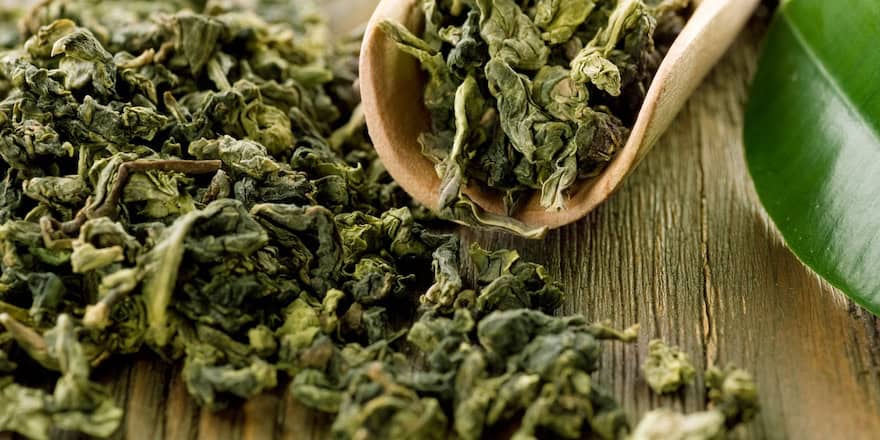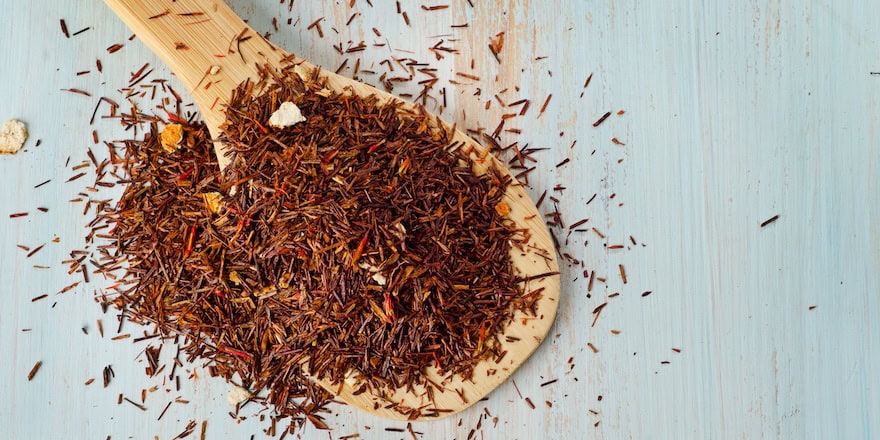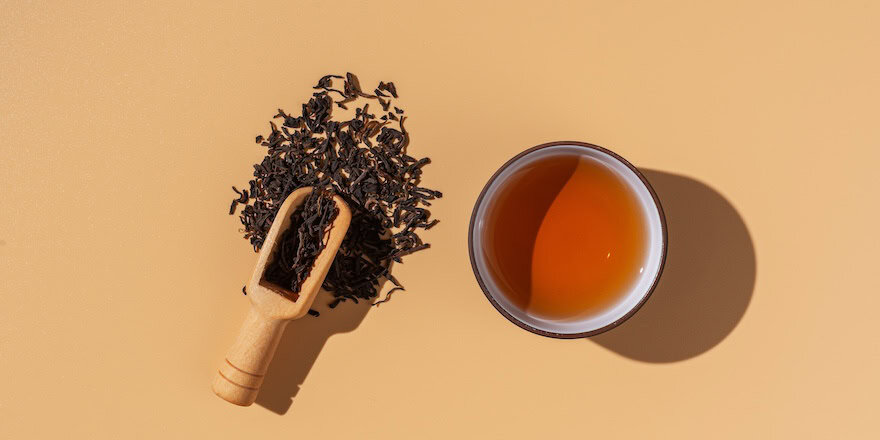There is a wide variety of tea-based beverages; they all come from the same plant: Camellia Sinensis.
This plant contains theine, the equivalent of caffeine. Their benefits and the metabolism-stimulating effects vary depending on how they’re produced and their nutritional composition.
Tea is a source of protective antioxidants. It mainly provides flavonoids, compounds that help prevent aging of the body and strengthen it.
Their wide variety offers a natural solution for losing weight based on your taste preferences.
Green tea, black tea, white tea, red tea… Which one to choose? And how to incorporate it into a weight-loss routine? I’m sharing with you five teas for sustainable weight loss to effectively support your healthy lifestyle habits.
N.B.: consume your cups of tea preferably outside of meals to avoid reduced absorption of iron, calcium and magnesium.
📚 Read also | A dietitian selected the 10 best weight-loss programs
1. White tea

A mild flavor and lower in caffeine than others, the leaves are kept in their natural state. It is appreciated for its aromas and its various benefits.
When drinking it, favor hot water between 50-80°C and a long infusion of about 15 minutes, about 2 cups per day.
Its high catechin content (EGCG and others) would have beneficial effects on fat cells, according to this German study.
White tea would act on adipogenesis by limiting the formation of new adipocyte cells; it would inhibit fat storage in existing adipocytes and promote the breakdown of fats to produce energy.
2. Green tea

Undoubtedly the most studied, green tea is the most popular tea for weight loss and as an antioxidant.
Several studies have highlighted its effectiveness for losing weight, reducing body fat mass, maintaining body weight by preventing weight gain and regulating appetite.
You can choose a flavored green tea, blended with other herbs, or plain. Prepare it with hot water (maximum 80°C) and let it steep for about 5 minutes.
Matcha, a powder made from ground tea leaves, is even more concentrated in benefits.
Two to three cups per day of green tea are recommended to help with weight loss.
3. Red tea or rooibos

Originating from South Africa, it is extracted from another shrub, Aspalathus linearis.
Its slightly sweet flavor and pretty tinted hue contain other antioxidants: aspalathin, nothofagin, polyphenols including flavonoids.
Although it is not strictly speaking a tea, it has its place on this list thanks to its health and slimming effects. It could also improve lipid metabolism and reduce adipogenesis by promoting stable blood sugar levels.
It is also known for its anti-stress and relaxing effects.
Laissez infuser 5 à 10 minutes environ, et buvez-le nature ou avec des rondelles de citron. Je conseille deux à trois tasses par jour, à n’importe quel moment de la journée puisque le rooibos ne contient pas de théine.
4. Fermented Pu-erh tea

Traditionally used in Chinese medicine, this dark fermented tea stands out for its unique taste.
It is also credited with slimming properties, likely linked to the transformation of these antioxidants into theaflavins and thearubigins.
It is often consumed at the end of a meal to reduce the absorption of dietary fats and improve digestion.
It may help reduce body fat, more precisely waist circumference, thanks to its polyphenols and natural statins. This is shown by a study conducted on overweight individuals.
5. Kombucha, the detox drink

Made from green or black tea, sugar and a bit of mother of kombucha, this fermented and slightly carbonated drink is gaining popularity, notably for its benefits for the gut microbiota.
An ancestral probiotic beverage for which anti-inflammatory, antimicrobial and anti-diabetic effects have been observed.
Consuming kombucha during a meal may help lower the glycemic index and the insulin index.
There are multiple benefits to pairing a balanced diet with this particular tea to help with weight loss. Improved satiety, fewer insulin spikes, and less storage as triglycerides to better mobilize reserves.
If you choose a store-bought kombucha tea, make sure it contains less than 5 g of carbohydrates.
How can tea help with weight loss?
Good hydration
Because staying adequately hydrated is a key element for health, and to promote the elimination of metabolic waste and a healthy weight, tea is a delicious way to increase your water intake.
Several studies have even shown that water can help reduce caloric intake and improve body composition.
Drinking 1 to 3 cups of tea per day to complement your diet and fluid intake helps provide variety to prevent you from getting bored with plain-tasting water.
Diuretic and draining properties
Tea, whether combined with other plant-derived active ingredients or not, increases urine output. An effective property for fighting fluid retention and eliminating excess body water.
These draining and diuretic effects can help you more easily lose the first excess kilos, contributing to a feeling of lightness with reduced swelling in the legs, ankles, abdominal area, hands, and arms.
Increased thermogenesis
Some teas high in caffeine and catechins (the antioxidants in tea) can help increase energy expenditure.
Following this meta-analysis, researchers concluded that if tea can reduce body weight and help maintain weight lost after a slimming diet, it does so by stimulating thermogenesis and fat oxidation.
Improved digestion
Depending on the varieties of teas and the associated plants, they can relieve certain digestive disorders such as intestinal inflammation, gas, or bloating.
This can also help intestinal transit and gastric emptying. Improved digestion helps better absorption of nutrients, therefore improving the functioning of the body.
During a diet or dietary rebalancing, a less bloated belly, less fatigue, and regular bowel transit help mentally and physically with weight loss.
A natural appetite-suppressing effect
Tea could help regulate blood sugar by slowing postprandial glucose absorption. It may improve insulin resistance.
Un point essentiel lorsque vous adoptez de nouvelles habitudes alimentaires. Faim et satiété sont ainsi mieux régulées.
A study also highlighted the effect of catechins combined with caffeine. Regular consumption would help increase the feeling of fullness and reduce snacking and cravings between meals.
📚 Also read | The 4 best natural appetite suppressants according to a pharmacist
Sources and scientific studies
Stookey JD, Constant F, Popkin BM, Gardner CD – Drinking water is associated with weight loss in overweight dieting women independent of diet and activity – Journal of Human Nutrition and Dietetics, 2008
Hursel R, Viechtbauer W, Westerterp-Plantenga MS. The effects of green tea on weight loss and weight maintenance: a meta-analysis – Int J Obes, 2009
Josic J, Tholen Olsson A, Wickenberg J, Lindstedt S, Hlebowicz J – Does green tea affect postprandial glucose, insulin and satiety in healthy subjects – Nutrition Journal, 2010
Marc Winnefeld; Jörn Söhle, Anja Knott, Ursula Holtzmann, et al – White Tea extract induces lipolytic activity and inhibits adipogenesis in human subcutaneous pre-adipocytes, Nutrition & Metab. J., 2009
F Thielecke , G Rahn, M Boschmann – Epigallocatechin-3-gallate and postprandial fat oxidation in overweight/obese male volunteers: a pilot study – Eur J Clin Nutr, 2010
Effects of rooibos (Aspalathus linearis) on oxidative stress and biochemical parameters in adults at risk for cardiovascular disease, Journal of Ethnopharmacology, 2011
Atkinson et al. – Glycemic index and insulin index after a standard carbohydrate meal consumed with live kombucha – Front Nutr, 2023.
Yasuyuki Oi, I-Ching Hou, Hiroyuki Fujita, Kazunaga Yazawa – Antiobesity effects of Chinese black tea (Pu-erh tea) extract and gallic acid – Phytotherapy Research, 2011



